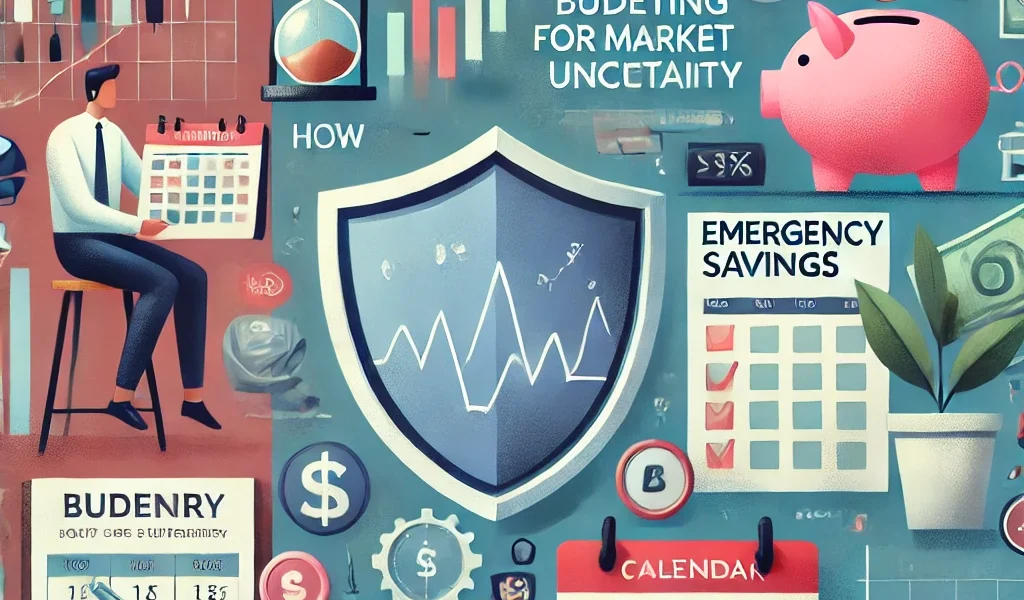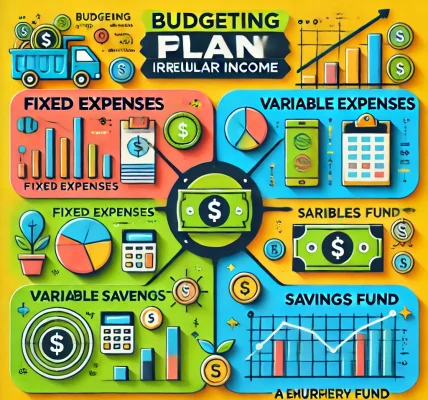In an unpredictable economic environment, preparing your finances for market uncertainty is crucial. Market volatility, economic downturns, and unexpected global events can significantly impact your financial well-being. By developing a robust budgeting strategy, you can protect your assets, maintain your lifestyle, and even seize opportunities during uncertain times.
This guide will provide practical steps to create a budget that withstands market fluctuations while helping you stay financially secure and stress-free.
Understanding Market Uncertainty
Market uncertainty refers to unpredictable changes in the financial environment caused by factors like:
- Economic recessions
- Stock market volatility
- Global events (e.g., pandemics, geopolitical tensions)
- Inflation and interest rate changes
- Corporate layoffs and job market shifts
Such uncertainty can impact personal finances through income instability, increased living costs, or fluctuating investment returns. Therefore, a proactive and adaptive budgeting approach is essential.
Step 1: Assess Your Current Financial Position
Start by thoroughly evaluating your financial standing. This foundation will help you create a resilient budget.
1. Identify Your Income Sources
List all your reliable income streams, including:
- Primary salary
- Side hustles or freelance work
- Investment dividends
- Passive income (e.g., rental properties)
2. Track Your Expenses
Categorize your spending into three groups:
- Fixed Expenses: Rent/mortgage, insurance premiums, utility bills
- Variable Expenses: Groceries, transportation, healthcare
- Discretionary Spending: Entertainment, dining out, subscriptions
Use budgeting apps like Mint, You Need a Budget (YNAB), or Personal Capital to track and analyze your expenses.
Step 2: Build an Emergency Fund
An emergency fund is your financial safety net during uncertain times. Aim to save 3-6 months’ worth of living expenses.
Best Practices for Emergency Funds:
- High-Yield Savings Account: Store your emergency savings in a liquid, high-interest account.
- Consistent Contributions: Automate monthly transfers to grow your emergency fund.
- Replenish Quickly: If you use it, prioritize rebuilding the fund.
Step 3: Prioritize Essential Expenses
During market uncertainty, focus on meeting essential needs first. Allocate your budget to these categories:
- Housing Costs (rent/mortgage payments)
- Utilities and Insurance
- Groceries and Healthcare
- Debt Repayments (especially high-interest debt)
Consider using the 50/30/20 rule as a flexible guideline:
- 50% for essential expenses
- 30% for discretionary spending
- 20% for savings and investments
Step 4: Reduce Non-Essential Spending
Cut back on unnecessary expenses to free up resources for more critical needs.
Ways to Trim Your Budget:
- Cancel Unused Subscriptions: Streaming services, gym memberships
- Limit Dining Out: Cook meals at home
- Negotiate Bills: Ask for discounts on insurance, phone plans
- Delay Large Purchases: Postpone non-essential buys until stability returns
Step 5: Diversify Your Income Sources
Relying on a single income stream can be risky during uncertain times. Explore ways to supplement your income:
- Freelancing or Consulting: Offer your skills part-time
- Passive Income: Invest in dividend stocks, rental properties
- Online Opportunities: Consider teaching, writing, or e-commerce
Step 6: Adjust Your Investment Strategy
Market volatility can impact your investment portfolio, but strategic adjustments can mitigate risks.
Investment Considerations During Market Uncertainty:
- Diversification: Spread investments across different asset classes (stocks, bonds, real estate).
- Emergency Liquidity: Keep a portion of your assets in easily accessible cash.
- Dollar-Cost Averaging: Invest regularly regardless of market fluctuations to reduce timing risk.
- Rebalance Your Portfolio: Align your investments with your risk tolerance and financial goals.
Step 7: Plan for Job Loss or Income Reduction
Prepare for potential income disruptions by creating a contingency plan:
- Upskill or Retrain: Enhance your skills to stay competitive in the job market.
- Networking: Maintain professional relationships to identify new opportunities.
- Debt Management: Prioritize paying down high-interest debt and consider consolidating loans.
Step 8: Automate and Monitor Your Budget
Automation can help you stay consistent while monitoring your progress allows you to adapt quickly.
Automation Tips:
- Set Up Auto-Transfers: Schedule regular contributions to emergency and investment accounts.
- Automatic Bill Payments: Avoid missed payments and late fees.
Monitor and Adjust Regularly:
- Review your budget monthly.
- Adjust spending in response to changes in your financial situation.
- Update financial goals annually or during major life changes.
Step 9: Maintain Mental and Financial Wellness
Market uncertainty can be stressful. Managing both your financial and mental health is essential:
- Practice Mindfulness: Reduce anxiety through meditation or mindfulness exercises.
- Limit News Exposure: Avoid constant monitoring of market fluctuations.
- Seek Professional Help: Consult a financial advisor for personalized guidance.
Step 10: Prepare for Future Uncertainty
A solid financial plan should evolve with changing circumstances. Here are ways to future-proof your finances:
- Insurance Coverage: Ensure you have adequate health, life, and disability insurance.
- Estate Planning: Keep your will, power of attorney, and beneficiary designations up-to-date.
- Financial Education: Continuously enhance your financial literacy.
Conclusion: Stay Financially Resilient in Uncertain Times
Budgeting for market uncertainty requires a proactive and adaptable approach. By building an emergency fund, reducing expenses, diversifying income, and adjusting investments, you can weather economic fluctuations with confidence.
Start today by assessing your finances, automating essential processes, and staying informed. With a well-prepared budget, you can not only survive but thrive during market uncertainty, ensuring long-term financial stability and peace of mind.




